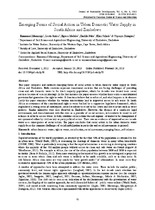| dc.contributor.author | Manzungu, Emmanuel | |
| dc.contributor.author | Jonker, Lewis | |
| dc.contributor.author | Madaka, Egness | |
| dc.contributor.author | Naka, Zandile | |
| dc.contributor.author | Sithole, Ellen | |
| dc.contributor.author | Dzingirai, Vupenyu | |
| dc.date.accessioned | 2014-07-03T07:07:48Z | |
| dc.date.available | 2014-07-03T07:07:48Z | |
| dc.date.issued | 2013 | |
| dc.identifier.citation | Manzungu, E., et al. (2013). Emerging forms of social action in urban domestic water supply in South Africa and Zimbabwe. Journal of Sustainable Development, 6(3): 70-82 | en_US |
| dc.identifier.issn | 1913-9063 | |
| dc.identifier.uri | http://hdl.handle.net/10566/1116 | |
| dc.description.abstract | This paper compares and contrasts emerging forms of social action in urban domestic water supply in South Africa and Zimbabwe. Both countries represent transitional societies that are facing challenges of providing clean and safe domestic water to the black majority population, which for decades was denied basic social services because of a racist ideology. In the first instance the paper assesses whether there exists a constitutional provision that guarantees the right to water. It then turns to how that is enforced, and what happens in its absence. Lastly the paper examines whether the various interventions lead to improved access to safe water. In South Africa an awareness of the constitutional right to water backed by a supportive legislative framework, which engendered a strong sense of entitlement, caused residents to resort to the courts and direct action such as street protests. Similar initiatives were also observed in Zimbabwe. However, the absence of a conducive legal environment, and disenchantment with the state as a provider of social services, led residents to resort to self reliance in order to access water. In both countries social action was not organic –it tended to be championed if not sponsored either by civil society or party political actors. There was no evidence of improved access to safe water as a consequence of social action. The paper concludes that social action in the urban domestic water supply faces the common challenges of social mobilization in particular and social movements in general. | en_US |
| dc.language.iso | en | en_US |
| dc.publisher | Canadian Center of Science and Education | en_US |
| dc.rights | © 2013 Manzungu, et al.; licensee Canadian Center of Science and Education.This is an Open Access article distributed under the terms of the Creative Commons Attribution License (http://creativecommons.org/licenses/by/3.0), which permits unrestricted use, distribution, and reproduction in any medium, provided the original work is properly cited | |
| dc.source.uri | http://dx.doi.org/10.5539/jsd.v6n3p70 | |
| dc.subject | Urban domestic water | en_US |
| dc.subject | Right to water | en_US |
| dc.subject | Social action | en_US |
| dc.subject | Social movements | en_US |
| dc.subject | Self-reliance | en_US |
| dc.title | Emerging forms of social action in urban domestic water supply in South Africa and Zimbabwe | en_US |
| dc.type | Article | en_US |
| dc.privacy.showsubmitter | false | |
| dc.status.ispeerreviewed | true | |
| dc.description.accreditation | Web of Science | en_US |

